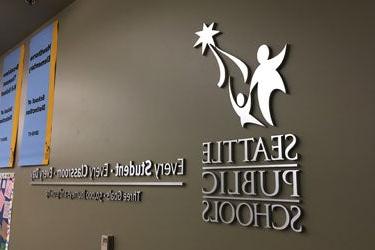Meetings
Seattle School Board Meetings
Regular Board Meetings are generally held on Wednesdays, but are occasionally rescheduled around holidays. Regular School Board meetings start at 4:15 p.m. Board meetings are held at the John Stanford Center for Educational Excellence.
Please visit the Board Resolutions webpage for adopted resolutions and the Annual Reports webpage for a list of when and how reports to the Board have been delivered.
Board Calendar
Watch School Board Meetings

Regular Board Meetings are live streamed on SPSTV.
Regular Board meetings can also be viewed on the following Seattle channels:
- Comcast 26 (standard-def) 319 (hi-def)
- Wave 26 (standard-def) 695 (hi-def)
- Century Link 8008 (standard-def) 8508 (hi-def)
Watch Past Meeting Recordings
Watch past board meetings recordings of the Seattle School Board.
Public Testimony
The Seattle School Board welcomes members of the public to the Regular meetings of the Board and dedicates time at these meetings for public testimony.
It is important for all community members to feel welcome and safe in the Board’s business meetings. Audience members will be expected to treat all attendees with respect and civility, just as Seattle Public Schools expects of students in our schools.
Public testimony will be taken in person and by teleconference from those who sign up to provide testimony and who are placed on the testimony list per the process described below.
Regular and Special Meetings Agendas
Regular and Special Board meeting agendas are posted at least 24 hours in advance of the meeting. At each Board meeting, minutes from the previous meetings are approved and will be posted to the agenda webpage once available.
Board Committee Materials
There are three current committees of the Board.
- Audit Committee
- Ad Hoc Community Engagement Committee
- Ad Hoc Policy Manual Review Committee
About the Board Approval Process
The Seattle School Board generally holds at least one Regular Board meeting monthly. During Regular Board Meetings, the Board takes public testimony and votes to take most final actions. However, Board discussions regarding items approved during Regular Board meetings often begin weeks earlier with preparation of Board Action Reports and Introduction to the Board. Information is included here to support the public in tracking items throughout this extended process.
Board Action Report Development
When an item is brought to the Board for action, a Board Action Report (BAR) is drafted, along with any accompanying Board policy or other attachments as needed. Often these documents are prepared by staff, but Directors also may develop Board Action Reports, generally to revise or adopt policies and resolutions.
Regular Board Meeting Agendas and Use of the Consent Agenda
Board Action Reports are placed on draft Regular Board Meeting agendas developed by the School Board Office. These draft agendas are then reviewed and finalized by the Board President and Superintendent, which set two Regular Board meeting agendas at a time. BARs for contracts, grants, and other routine business like meeting minutes are placed directly on a Consent Agenda for action by the Board. Other Board Action Reports are scheduled to first be introduced at one Regular Board meeting, and voted on at the next Regular Board meeting. When an item is introduced, it is presented by staff or the sponsoring Director, and Directors have the opportunity to ask questions and discuss, but no action is taken. The public also has the opportunity at this point, and during all Regular Board meetings, to provide feedback by signing up to provide public testimony.
After introduction, the Board Action item is then generally scheduled for a vote during the next Regular Board meeting as part of the Consent Agenda. Per Board Policy No. 1420, Proposed Agendas & Consent Agenda, a Consent Agenda is used to expedite business at Regular Board meetings by having the Board approve multiple items with one motion and vote. The use of a Consent Agenda is best practice for governing bodies (See more information on using a Consent Agenda to streamline meetings from the Municipal Research Services Center). The Student Outcomes Focused Governance Manual, developed by the Council of Great City Schools and AJ Crabill, advises that all consent-eligible items should be placed on a Consent Agenda in order to focus Board meeting time on improving student outcomes (See the Board-adopted student outcomes goals and guardrails).
When an item is placed on the Consent Agenda, it may be removed by any member of the Board during the Regular Board meeting. Any items removed from the Consent Agenda are discussed and voted on individually later in the meeting.
